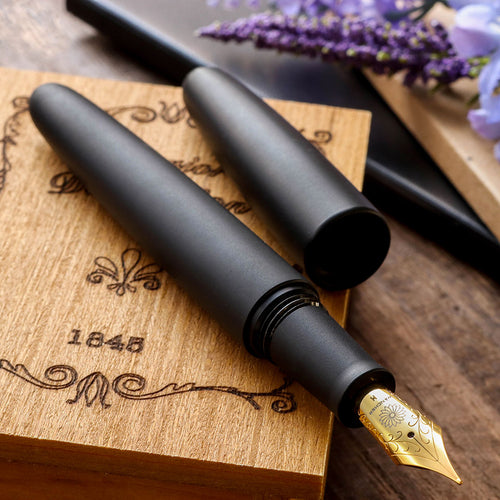Reintroduction Series
True Ebonite Fountain pens
Art is known not just by its beauty but by the history and the story that it carries, and at Wancher, we are determined to share the story behind the art used in each of our collections. Through this reintroduction series, we hope to dive in deeper into the history and the story that our fountain pens carry and the craftsmanship behind them.

Mastering the Japanese tradition of "sharpening"
Wancher's Aesthetics in Fountain Pens made of Ebonite
Fountain pens and Japanese swords are very similar.
It is not only the impression one would get from the phrase 'the pen is mightier than the sword.' While the Japanese Sword and the Fountain pen are used for different purposes, both are tools that pursue functionality and are 'comprehensive works of art' that make full use of traditional techniques.
Japanese swords use a technique called 'togu' to bring out the beauty of the blade to the utmost limit. In the same way, Wancher's fountain pens also use the traditional Japanese techniques for sharpening, "togi," and polishing.
Wancher sticks to manual sharpening, 'togi,' and 'polishing' because we have found traditional Japanese aesthetics in these processes.
The mastery of the craftsmen's techniques to achieve a mirror-like shine and beauty without dullness is an aesthetic that leads to the 'sharpening of Japanese swords.'
Here we would like to introduce the smooth and intricate beauty that can only be achieved by the manual 'Togi' technique.

Learning from Philosophy of Sharpening and Polishing
Techniques of Japanese Sword
In the past, Japanese people believed that the soul resided in swords. In order to purify them, the act of 'wiping' to cleanse the sword of defilement, followed by the act of 'sharpening' was emphasized. Incidentally, it is said that 'it was the Japanese who first created stone tools with long cutting edges by sharpening and polishing processes' ("Guns, Germs, and Iron" by J. Diamond, translated by Akira Kurahone / Soshisha 2000).

The first mention of Japanese sword honing and polishing appears in 'Engishiki' of the Heian period [794-1185(/1192)]. In addition, the Kamakura period [1185(/1192)-1333]'s 'Kanchi-in Honmei Zukushi' states the names of two swordsmiths, indicating that 'honing and polishing' was part of the manufacturing process of Japanese swords in this period and that there were craftsmen specializing in these fields.
The beauty and value of Japanese swords have not been lost and have continued to the present day because the Hon'ami family and many other swordsmiths have passed down the art of sharpening and polishing Japanese swords to the present day. The true reason for the beauty of the Japanese sword lies in the accumulation of trial and error and ingenuity over many generations. We can find that the Japanese people's passion and dedication to honing and polishing techniques have been cultivated over a long history.


Wancher's fountain pens, like Japanese swords, are not unrelated to the traditional Japanese manual processes of 'sharpening' and 'polishing.' We have learned a great deal from the philosophy and techniques of Japanese sword sharpening and polishing in order to bring out the functionality and beauty of our fountain pens.
Wancher's dedication to hand-sharpening and polishing
'True Ebonite' is one of Wancher's first Dream Pen models. Let us explore more about the materials and processing method of this fountain pen.

Obtaining the Material
Ebonite is a natural resin made from natural rubber. Familiar products, such as bowling balls, are made of ebonite. It is characterized by its hardness, resistance to cracking, and impact on resistance. It is an ideal material for making fountain pens because it has high chemical resistance, is invulnerable to deterioration and shape change, has a moderate weight and texture, and shines when polished.
Wancher's ebonite fountain pens begin with the selection of materials. After years of research and exploration of ebonite from different nations, including India, we arrived at making our Dream pens using the Ebonite from Japan. Wancher prides itself in the fact that our True Ebonite pens are made at one of the oldest and the only remaining Japanese companies that can produce ebonite, namely NIKKO EBONITE located in Tokyo.

Hand-Sharpened and Polished Ebonite Fountain Pens
with a Jewel-like Shine
Our ebonite fountain pens have a deep, clear shine that reflects the spirits of the maker, the polisher, and the user. And the texture feels comfortable in your hand. Whether for everyday use, as a gift, or for your collection, we invite you to try our Wancher fountain pens, which have been polished to the level of art.


